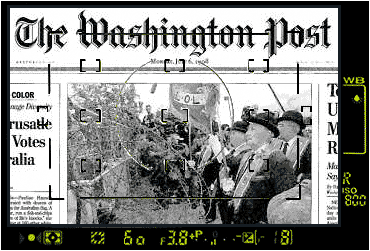 In 1933 Eugene Meyer bought the Washington Post Company (NYSE:WPO) while in bankruptcy. Is the Post headed that direction again? The Post ombudsman suggests that "The circumstances are similar today" that created the first bankruptcy.
In 1933 Eugene Meyer bought the Washington Post Company (NYSE:WPO) while in bankruptcy. Is the Post headed that direction again? The Post ombudsman suggests that "The circumstances are similar today" that created the first bankruptcy.In ombudsman Andrew Alexander's article, from Sunday June 14, 2009 - Big Changes Bring Fears About Quality, Alexander cites an almost unanimous response to his query of staffers about what is in store for the Post's readers. They pointed to a loss of quality for the readership.
(Continued after the Jump)
While the article, in large part, looks at the text side of the paper, the paper's talented photography staff continues to diminish, replaced by file images, wire photos, and freelancers without the skill set and capabilities of a staffer. The Washington Post has arguably the most talented staff photography team in the country. Yet, they are taxed by not only needing to fill the needs of the newspaper, but also the website, and other Washington Post Co. divisions. Next thing you know, they will be getting assignments from Kaplan for photography for their SAT tests.
June 5, as the brain drain continues, Ju-Don Roberts stepped down as Managing Editor of the online division, headed off to an online division of Rubert Murdoch's News Corp. This, as Tom Kennedy, who was Managing Editor for Multimedia left in February, leaving Michel duCille to run what is reported to be a combined department. duCille, a two-time Pulitzer Prize winner is Managing Editor for Photography at the Post.
Can an over-taxed staff continue to deliver the same quality and caliber of images as before? Not likely, without substantial help from freelancers, and an over reliance on wire and agency images. Yet, this suggests that the freelancers, working under an unfair contract that demands rights for use in all Washington Post properties, and which pays a pittance, are as capable and talented as the staffers. They are not.
This, while just last week the union that represents the employees of the Washington Post ratified their new 2-year contract that chips away at the seniority of the employees, allowing the paper to protect employees regardless of their seniority status. Thus, it would not be unreasonable to see the Post protect newer cheaper hires and cut senior staff above and more expensive than the cheaper ones. With an almost $54 million loss in Q1, and the slashing and combining of sections, quality and quantity are already suffering.
As the demand for eyeballs in print and online intensifies, and peoples' attention spans get shorter and shorter, quality visuals will be what keeps people reading, or in the very least, attracts people to the content in the first place, and then begins reading a good lede. If a picture is worth a thousand words, why is it that photography departments everywhere are getting shorted in favor of their copy-writing brethren?
Step 1: Newspapers around the country should be paying their freelancers a higher assignment fee than it costs to pay a staffer, and don't demand an unreasonable rights package. One time use in the paper and online should be sufficient. Doing this alone will demonstrate the costs savings that can be realized by maintaining a staff. Further, you will attract top talent to your department for freelancing, not those naive enough to accept low pay and rights grabs until someone sets them straight.
To those who say "nice idea, but we just don't have the money", I say BS. You are the captain of the ship - and you should be willing to do right by your "crew" and that includes protecting the officers (i.e. staffers) as well as those that toil below deck (i.e. freelancers). When the ship has gone down, do you want to be remembered as the captain who sold out his crew to try to save his ship and himself, or the one who did right by his crew to the bitter end? Doing battle with accountants and lawyers inside your company on these issues won't be easy, but if your job was easy, anyone could do it.
Please post your comments by clicking the link below. If you've got questions, please pose them in our Photo Business Forum Flickr Group Discussion Threads.
No comments:
Post a Comment